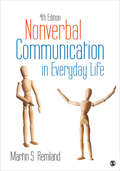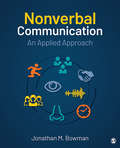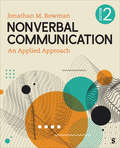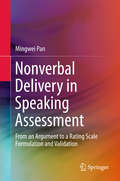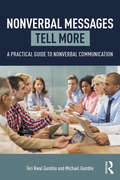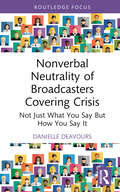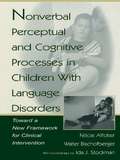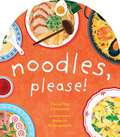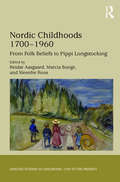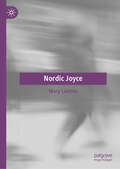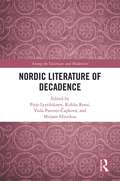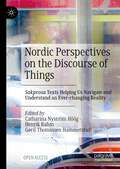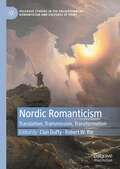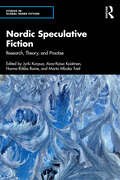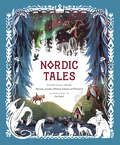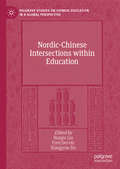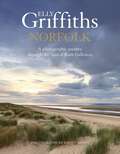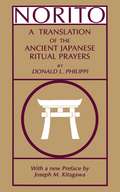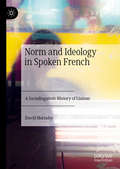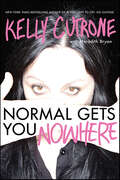- Table View
- List View
Nonverbal Communication in Everyday Life
by Martin S. RemlandNonverbal Communication in Everyday Life, Fourth Edition, is the most comprehensive, thoroughly researched, and up-to-date introduction to the subject of nonverbal communication available today. Renowned author Martin S. Remland introduces nonverbal communication in a concise and engaging format that connects foundational concepts, current theory, and new research findings to familiar everyday interactions. Presented in three parts, the text offers full and balanced coverage of the functions, channels, and applications of nonverbal communication. This approach not only gives students a strong foundation, but also allows them to fully appreciate the importance of nonverbal communication in their personal and professional lives.
Nonverbal Communication in Everyday Life
by Martin S. RemlandNonverbal Communication in Everyday Life, Fourth Edition, is the most comprehensive, thoroughly researched, and up-to-date introduction to the subject of nonverbal communication available today. Renowned author Martin S. Remland introduces nonverbal communication in a concise and engaging format that connects foundational concepts, current theory, and new research findings to familiar everyday interactions. Presented in three parts, the text offers full and balanced coverage of the functions, channels, and applications of nonverbal communication. This approach not only gives students a strong foundation, but also allows them to fully appreciate the importance of nonverbal communication in their personal and professional lives.
Nonverbal Communication: An Applied Approach
by Dr. Jonathan Michael BowmanNonverbal Communication: An Applied Approach teaches students the fundamentals of nonverbal communication by making connections between the principles they learn and the everyday communication they perform and interpret. Award-winning teacher and author Jonathan M. Bowman uses a narrative style and an applied approach that is informed by the important theories and research-driven knowledge of this interdisciplinary area of study. The approach encourages students to understand the relevancy of nonverbal codes by exploring applications sooner rather than in the latter half of their course. Bowman brings in a unique focus on culture and social justice, demonstrating how nonverbal communication shapes how we interact in a diverse society.
Nonverbal Communication: An Applied Approach
by Dr. Jonathan Michael BowmanNonverbal Communication: An Applied Approach teaches students the fundamentals of nonverbal communication by making connections between the principles they learn and the everyday communication they perform and interpret. Award-winning teacher and author Jonathan M. Bowman uses a narrative style and an applied approach that is informed by the important theories and research-driven knowledge of this interdisciplinary area of study. The approach encourages students to understand the relevancy of nonverbal codes by exploring applications sooner rather than in the latter half of their course. Bowman brings in a unique focus on culture and social justice, demonstrating how nonverbal communication shapes how we interact in a diverse society.
Nonverbal Communication: An Applied Approach
by Jonathan Michael BowmanNonverbal Communication: An Applied Approach, Second Edition teaches students the fundamentals of nonverbal communication in a way that helps them see the connections between the principles they learn and the everyday communication they perform and interpret. Nonverbal Communication: An Applied Approach has taken a narrative style and applied approach that is informed by the important theories and research-driven knowledge of this interdisciplinary area of study. This approach encourages students to understand the relevancy of nonverbal codes right away, instead of waiting until the second half of the course to explore applications. Author Jonathan Bowman also brings in a unique focus on diversity and social justice, demonstrating how nonverbal communication shapes and molds how we interact in a diverse society. The Second Edition includes updated examples, a new Upgrade feature box examining the impact of digital experiences across the course of the lifespan, and updated key terms, guiding and closing questions, citations, photos, and figures.
Nonverbal Communication: An Applied Approach
by Jonathan Michael BowmanNonverbal Communication: An Applied Approach, Second Edition teaches students the fundamentals of nonverbal communication in a way that helps them see the connections between the principles they learn and the everyday communication they perform and interpret. Nonverbal Communication: An Applied Approach has taken a narrative style and applied approach that is informed by the important theories and research-driven knowledge of this interdisciplinary area of study. This approach encourages students to understand the relevancy of nonverbal codes right away, instead of waiting until the second half of the course to explore applications. Author Jonathan Bowman also brings in a unique focus on diversity and social justice, demonstrating how nonverbal communication shapes and molds how we interact in a diverse society. The Second Edition includes updated examples, a new Upgrade feature box examining the impact of digital experiences across the course of the lifespan, and updated key terms, guiding and closing questions, citations, photos, and figures.
Nonverbal Delivery in Speaking Assessment
by Mingwei PanWith an argument for embedding nonverbal delivery in speaking assessment as a point of departure, this book seeks to validate a proposed rating scale for incorporating nonverbal delivery and other conventional dimensions into speaking assessment with a mixed-methods approach. To illustrate the indispensable role of nonverbal delivery in speaking assessment, the book particularly includes snapshots of test-takers' de facto nonverbal delivery, which allow their respective levels to be investigated in a microscopic manner.
Nonverbal Messages Tell More: A Practical Guide to Nonverbal Communication
by Michael Gamble Teri Kwal GambleNonverbal Messages Tell More: A Practical Guide to Nonverbal Communication offers an active and dynamic approach to the study of nonverbal communication. The study of nonverbal cues and messages is a difficult undertaking, but Teri and Michael Gamble have put together a volume that approaches the field from a variety of perspectives. Nonverbal Messages Tell More bridges the relevance gap by making the text more accessible and interesting to students of all levels. It does so by highlighting examples of nonverbal behavior taken from popular culture including film, television, and broadcast and print news. This volume provides a thorough overview of the classic and contemporary research and theory for nonverbal communication. It contains a number of features, including experiential guidelines and activities that give students better self-insight and understanding of the nonverbal messages other individuals display. At the end of every chapter are a series of follow-up investigations designed to demonstrate mastery of the content and the ability to apply what was just learned. Nonverbal Messages Tell More also presents the necessary know-how for presenting oneself using nonverbal cues that encourage others to perceive you as personable and credible. It leaps ahead of other books on the subject by offering students an engaging, practical, and useful introduction to the study of nonverbal communication.
Nonverbal Neutrality of Broadcasters Covering Crisis: Not Just What You Say But How You Say It (Routledge Focus on Journalism Studies)
by Danielle F DeavoursOffering a critical and sensitive reflection on journalists’ nonverbal behaviors during their coverage of school shootings in the U.S., this book shows how individual- and social-level factors predict broadcasters’ nonverbal neutrality. Nonverbal behaviors have the ability to transmit bias, influence audiences, and impact perceptions of journalists. Yet journalists report receiving little to no training on nonverbal communication, despite often being placed in emotional, chaotic situations that affect their ability to remain neutral during coverage. This book provides theoretical and methodological contributions, as well as applicable advice, to assist researchers’, instructors’, and journalists’ understandings of ongoing boundary negotiations of this rarely discussed but highly impactful aspect of objectivity. Through the proposal of the Nonverbal Neutrality Theory, it outlines predictive patterns and routines that contribute to the variability of nonverbal neutrality, and equips readers, including industry professionals and journalism educators, with examples of best practice to help better plan for crisis coverage. The work draws on journalists’ reflections on professional norms and conceptualizations of nonverbal neutrality, vicarious traumatization, and social- and organizational-level influences. As one of the first to explore nonverbal neutrality, its predictive factors, and patterns across crisis events, this book provides a much-needed insight into the nonverbal behaviors of broadcast journalists at a time when the media relies ever more on visual delivery on television, digital, and social media networks.
Nonverbal Perceptual and Cognitive Processes in Children With Language Disorders: Toward A New Framework for Clinical intervention
by Walter Bischofberger F‚licie AffolterA growing body of literature is suggesting that many children with language disorders and delays--even those with so-called specific language impairment--have difficulties in other domains as well. In this pathbreaking book, the authors draw on more than 40 years of research and clinical observations of populations ranging from various groups of children to adults with brain damage to construct a comprehensive model for the development of the interrelated skills involved in language performance, and trace the crucial implications of this model for intervention. Early tactual feedback, they argue, is more critical for the perceptual/cognitive organization of experiences that constitutes a foundation for language development than either visual or auditory input, and the importance of tactually-anchored nonverbal interaction cannot be ignored if efforts at treatment are to be successful. All those professionally involved in work with children and adults with language problems will find the authors' model provocative and useful.
Nonviolent Communication: A Language of Life
by Marshall B. Rosenberg Arun GandhiDo you hunger for skills to improve the quality of your relationships, to deepen your sense of personal empowerment or to simply communicate more effectively? Unfortunately, for centuries our culture has taught us to think and speak in ways that can actually perpetuate conflict, internal pain and even violence. Nonviolent Communication partners practical skills with a powerful consciousness and vocabulary to help you get what you want peacefully. <P><P>In this internationally acclaimed text, Marshall Rosenberg offers insightful stories, anecdotes, practical exercises and role-plays that will dramatically change your approach to communication for the better. Discover how the language you use can strengthen your relationships, build trust, prevent conflicts and heal pain. Revolutionary, yet simple, NVC offers you the most effective tools to reduce violence and create peace in your life--one interaction at a time.
Nonviolent Communication: A Language of Life
by Marshall B. RosenbergAn enlightening look at how peaceful communication can create compassionate connections with family, friends, and other acquaintances. The book uses stories, examples, and sample dialogues to provide solutions to communication problems both at home and in the workplace. Guidance is provided on identifying and articulating feelings and needs, expressing anger fully, and exploring the power of empathy in order to speak honestly without creating hostility, break patterns of thinking that lead to anger and depression, and communicate compassionately. These non-violent communication skills are fully explained and can be applied to personal, professional, and political differences. Included in this new edition is information on how to compassionately connect with oneself.
Noodles, Please! (A to Z Foods of the World)
by Cheryl Yau Chepusova"Celebrating the versatility, popularity, and ubiquity of noodles, this board book gives hungry readers a delicious tour of pasta dishes from a variety of cultures and countries." —Kirkus Reviews Here&’s an alphabet book to set your taste buds aflame. Noodles are a universally loved food, from Ash Reshteh in Iran to Zaru Soba in Japan. In this board book shaped to mimic bowls, readers will discover 26 different varieties as they eat their way through the alphabet. Who knew noodles could be served so many ways: long and short, hot and cold, spicy and sweet, in broth and baked, paired with vegetables, meat and fish. Noodles, Please! provides a culinary tour of the world, highlighting cuisines from over a dozen different countries. With each new letter, a new dish is introduced identifying its country of origin and name written in both English and the country&’s native language. Whether learning about Tallarines Verdes for the first time, or a Naengmyeon aficionado, readers young and old are sure to slurp this one right up.
Nordic Childhoods 1700–1960: From Folk Beliefs to Pippi Longstocking (Studies in Childhood, 1700 to the Present)
by Reidar Aasgaard Marcia Bunge Merethe RoosThis volume strengthens interest and research in the fields of both Childhood Studies and Nordic Studies by exploring conceptions of children and childhood in the Nordic countries (Denmark, Finland, Iceland, Norway, and Sweden). Although some books have been written about the history of childhood in these countries, few are multidisciplinary, focus on this region as a whole, or are available in English. This volume contains essays by scholars from the fields of literature, history, theology, religious studies, intellectual history, cultural studies, Scandinavian studies, education, music, and art history. Contributors study the history of childhood in a wide variety of sources, such as folk and fairy tales, legal codes, religious texts, essays on education, letters, sermons, speeches, hymns, paintings, novels, and school essays written by children themselves. They also examine texts intended specifically for children, including text books, catechisms, newspapers, songbooks, and children’s literature. By bringing together scholars from multiple disciplines who raise distinctive questions about childhood and take into account a wide range of sources, the book offers a fresh and substantive contribution to the history of childhood in the Nordic countries between 1700 and 1960. The volume also helps readers trace the historical roots of the internationally recognized practices and policies regarding child welfare within the Nordic countries today and prompts readers from any country to reflect on their own conceptions of and commitments to children.
Nordic Joyce
by Mary LawtonThis book compares the interrelationship of Irish writer James Joyce's literary works and specific Nordic literature in translation, employing an onomastic and etymological framework. It elucidates the importance of these frequent Scandinavian associations and how they inform and shape his literary work. The development of Joyce's work shows a sustained interest in contemporary Nordic and Old Norse medieval literature. By analysing Joyce's works and paratexts alongside a cross-section of important texts - Dubliners (1907) with Hans Christian Andersen's "Lykkens Kalosker" ("The Goloshes of Fortune") and "Den Lille Havfrue" ("The Little Sea Maid"), Exiles (1914) with Henrik Ibsen's When We Dead Awaken (1899), and specific medieval writing (Old Norse sagas and poetry) with Joyce's critical essays and later works, including Ulysses and Finnegans Wake - this book shows that Joyce's use of Nordic material in his writing constitutes a more extensive set of connections than previously thought.
Nordic Literature of Decadence (Among the Victorians and Modernists)
by Pirjo Lyytikäinen Riikka Rossi Viola Parente-Čapková Mirjam HinrikusNordic Literature of Decadence fills a gap on the map of world literature and participates in a thriving area of research by extending the investigation of broadly understood fin de siècle decadence to unexplored areas of Nordic literature, which remain practically unknown to Anglophone audiences. In the Nordic countries the new Parisian movements were seen as having caused a malicious invasion, a ‘black flood’ that was spreading over the North destroying the very foundations of Nordic national cultures. Nevertheless, the appeal of this controversial movement was irresistible to discontents and innovators, even in countries where the old moral, religious and nationalist atmosphere still retained its stranglehold and modern urban, industrial and social developments lagged behind that of the metropoles breeding this new literature and art. The Nordic countries developed their own distinctive manifestations of decadence favouring allegorical and allusive forms, local rural settings and depictions of primitive nature, coupling the philosophical underpinnings of fin-de-siècle decadence with ancient Nordic mythology and rising national movements. Nordic decadence thus became a distinctive and recognizable phenomenon, which travelled back to France and other European countries, influencing the ongoing debate on decadence as it was conducted on a global scale. Nordic Literature of Decadence discusses literature from five Nordic countries: Denmark, Norway, Sweden, Finland and Estonia and offers additional and alternative perspectives to the cosmopolitan traffic and cultural exchanges of literary decadence that have been explored so far in the English language scholarship.
Nordic Perspectives on the Discourse of Things: Sakprosa Texts Helping Us Navigate and Understand an Ever-changing Reality
by Catharina Nyström Höög Henrik Rahm Gøril Thomassen HammerstadThis open access book deals with the role of written texts in an increasingly diverse and dynamic society, bringing together a series of studies anchored in the Scandinavian research tradition of sakprosa, which roughly translates as ‘subject-oriented prose’ or ‘professional communication’. The authors examine the written text’s capacity to transcend contextual boundaries, as a crucial factor in the importance of capturing and maintaining content as a manageable entity. The chapters each deal with a text type that manages complex content in a specialized way, including genre shifting in CSR reports, discourse networks in modern digital culture, digital and social media crisis communication, and epistemic positions in non-fiction. This book is relevant to fields such as text research, professional/digital communication, discourse analysis and literacy studies, and may also be of interest to disciplines such as history, rhetoric, organization studies, media studies/journalism, and linguistics.
Nordic Romanticism: Translation, Transmission, Transformation (Palgrave Studies in the Enlightenment, Romanticism and Cultures of Print)
by Cian Duffy Robert W. RixNordic Romanticism: Translation, Transmission, Transformation is an edited collection exploring the varied and complex interactions between national romanticisms in Britain, Denmark, Germany, Norway and Sweden. The collection considers both the reception and influence of Nordic romanticism in Britain and Germany and also the reciprocal impact of British and German romanticism in the Nordic countries. Taken as a whole, the volume suggests that to fully understand the range of these individual national romanticisms we need to see them not as isolated phenomena but rather as participating, via translation and other modes of reception, in a transnational or regional romanticism configured around the idea of a shared cultural inheritance in ‘the North’.
Nordic Speculative Fiction: Research, Theory, and Practise (Studies in Global Genre Fiction)
by Jyrki Korpua, Aino-Kaisa Koistinen, Hanna-Riikka Roine, and Marta Mboka TveitThis volume brings together scholarly theories and practices on speculative fiction from the Nordic countries, including Denmark, Finland, Iceland, Norway, and Sweden, that are all rooted in similar values, culture, and history yet are independent and unique societies. The book exhibits both the convergences and the diversity of the Nordics in fiction and fandom as well as in research.It traces the roots of Nordic speculative fiction, how it has developed over time, and how the changes in Nordic environments and societies caused by overhanging shared global issues – such as climate change, mass migration, and technological acceleration – find space in speculative practices. The first of its kind, this book allows for deeper insights into the unique characteristics that make Nordic literature and art recognisable and allows for a better understanding of the place of the Nordics within wider global culture systems. The chapters range from literary critiques, film and television studies, creative works by three Nordic creative writers, transcultural text comparisons, and contributions on speculative art to theoretical and methodological discussions on fandom, worldbuilding, and semantics.Part of the Studies in Global Genre Fiction series, this book contributes to connecting Nordic speculative fiction scholarship to the wider global community within the field. It will be of interest to scholars and general enthusiasts of speculative fiction and those with interest in Nordic fiction; film and television studies; literary, culture, or media studies; comparative literature; and cultural history or art-based research.
Nordic Tales: Folktales from Norway, Sweden, Finland, Iceland, and Denmark (Tales Ser.)
by Chronicle BooksNordic Tales is a collection of 16 traditional tales from the enchanting world of Nordic folklore.Translated and transcribed by folklorists in the 19th century, these stories are at once magical, hilarious, cozy, and chilling.Welcome to a world of mystical adventure—where trolls haunt the snowy forests, terrifying monsters roam the open sea, a young woman journeys to the end of the world, and a boy proves he knows no fear.• Offers a fascinating view into Nordic culture• The tales come alive alongside bold, contemporary art• Part of the popular Tales series, featuring Tales of Japan, Celtic Tales, Tales of India, and Tales of East AfricaNordic Tales will enthrall fans of fairytales and captivate those interested in the rich history of Nordic culture.Ulla Thynell's glowing contemporary illustrations accompany each tale, conjuring dragons, princesses, and the northern lights.• A visually gorgeous book that will be at home on the shelf or on the coffee table• A perfect gift for fairy tale and folklore lovers, fans of Nordic culture, people of Nordic ancestry, collectors of illustrated classics, and bibliophiles looking for a comforting wintertime read• Add it to the collection of books like D'Aulaires' Book of Norse Myths by Ingri d'Aulaire and Edgar Parin d'Aulaire, Norse Mythology by Neil Gaiman, and Mythology: Timeless Tales of Gods and Heroes by Edith Hamilton.People who love Greek mythology, roman mythology, Chinese mythology, Celtic mythology, and folklore and cultural studies from around the globe will love Nordic Tales.
Nordic-Chinese Intersections within Education (Palgrave Studies on Chinese Education in a Global Perspective)
by Fred Dervin Xiangyun Du Haiqin LiuThis book examines how the two educational systems of China and the Nordic countries intersect. Over the past decade, there has been increased growth and interaction between China and the Nordic countries due to both government encouragement and academic curiosity. This book rejects a simplistic approach that presents both spaces as culturally uniform, confronting ‘East’ and ‘West’ entities, and suggests a comparative and contrastive approach that is critical and reflexive in both theory and methodology. This does not solely concentrate on difference, but emphasises similarities, including studies on philosophical, conceptual and methodological issues. This nuanced edited collection will appeal to students and scholars of Nordic and Chinese education as well as globalisation and interculturality.
Norfolk
by Elly GriffithsA stunning companion to Elly Griffiths' beloved crime series, the Dr Ruth Galloway Mysteries, and a photographic journey through magical Norfolk.Norfolk, a land of peaceful broads, marshy fens, sprawling coastline and shady brecks, is the home of Dr Ruth Galloway, forensic archaeologist. A place steeped in folklore and history, visibly shaped by the lives of those who have come before, it has become an integral character in Elly Griffiths' bestselling crime series.In this book Elly takes us through a year in the Norfolk landscape, featuring the fascinating locations that have inspired her series and her writing. From seascapes to farmlands, wetlands to woodlands, churches to cottages, this beautiful book captures Norfolk in all its glorious variety and is the perfect gift for any Elly Griffiths fan.
Norito: A Translation of the Ancient Japanese Ritual Prayers - Updated Edition
by Donald L. PhilippiThis volume presents the only English translation of the prayers of Japan's indigenous religious tradition, Shinto. These prayers, norito, are works of religious literature that are basic to our understanding of Japanese religious history. Locating Donald Philippi as one of a small number of scholars who have developed a perceptive approach to the problem of "hermeneutical distance" in dealing with ancient or foreign texts, Joseph M. Kitagawa recalls Mircea Eliade's observation that "most of the time [our] encounters and comparisons with non-Western cultures have not made all the `strangeness' of these cultures evident. . . . We may say that the Western world has not yet, or not generally, met with authentic representatives of the `real' non-Western traditions." Composed in the stately ritual language of the ancient Japanese and presented as a "performing text," these prayers are, Kitagawa tells us, "one of the authentic foreign representatives in Eliade's sense." In the preface Kitagawa elucidates their significance, discusses Philippi's methods of encountering the "strangeness" of Japan, and comments astutely on aspects of the encounter of East and West.
Norm and Ideology in Spoken French: A Sociolinguistic History of Liaison
by David HornsbyThis volume offers a diachronic sociolinguistic perspective on one of the most complex and fascinating variable speech phenomena in contemporary French. Liaison affects a number of word-final consonants which are realized before a vowel but not pre-pausally or before a consonant. Liaisons have traditionally been classified as obligatoire (obligatory), interdite (forbidden) and facultative (optional), the latter category subject to a highly complex prescriptive norm. This volume traces the evolution of this norm in prescriptive works published since the 16th Century, and sets it against actual practice as evidenced from linguists’ descriptions and recorded corpora. The author argues that optional (or variable) liaison in French offers a rich and well-documented example of language change driven by ideology in Kroch’s (1978) terms, in which an elite seeks to maintain a complex conservative norm in the face of generally simplifying changes led by lower socio-economic groups, who tend in this case to restrict liaison to a small set of traditionally obligatory environments.
Normal Gets You Nowhere
by Meredith Bryan Kelly Cutronenor-mal: 2a: according with, constituting, ornot deviating from a norm, rule or principle b: conforming to a type, standard, or regular pattern 4 a: of, relating to, or characterized by average intelligence or development Uh, who wants that?Hot on the heels of her New York Times bestseller IfYou Have to Cry, Go Outside, Kelly Cutrone isback with another no-holds-barred book to awaken our souls and kick our assesinto gear. In Normal Gets You Nowhere, she invites us to get our freakon. History is full of successful, world-changing people who did not fitin. Think Nelson Mendela, Joan of Arc, EleanorRoosevelt, John Lennon. Instead of changing themselves to accommodate thestatus quo or what others thought they should be, these people hung a light ontheir differences – and changed humanity in the process. There’s already anarmy of supertalented uberfreakschanging the world–isn’t it time you joined them?
